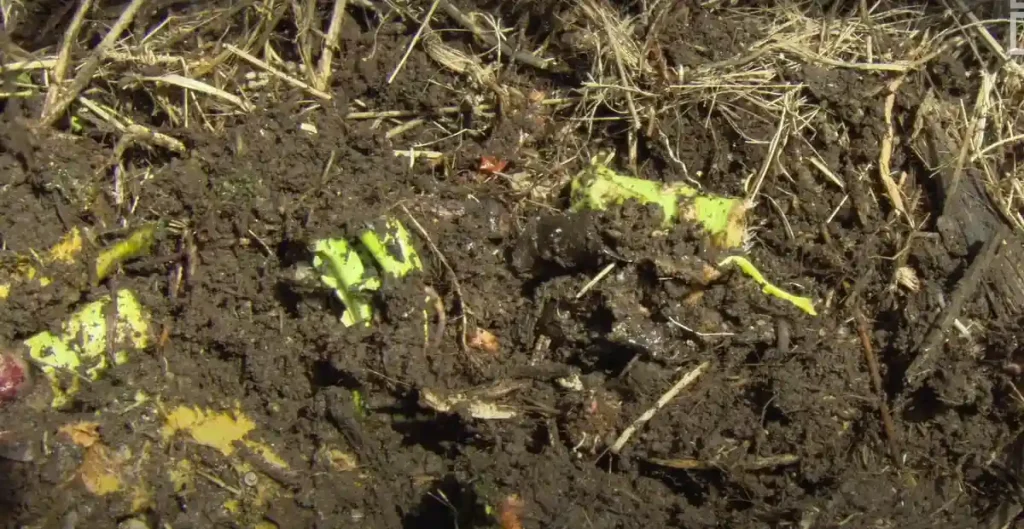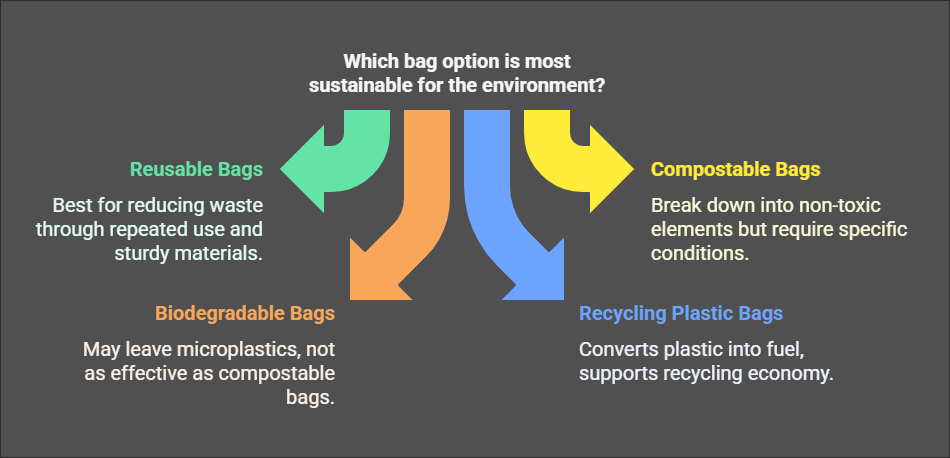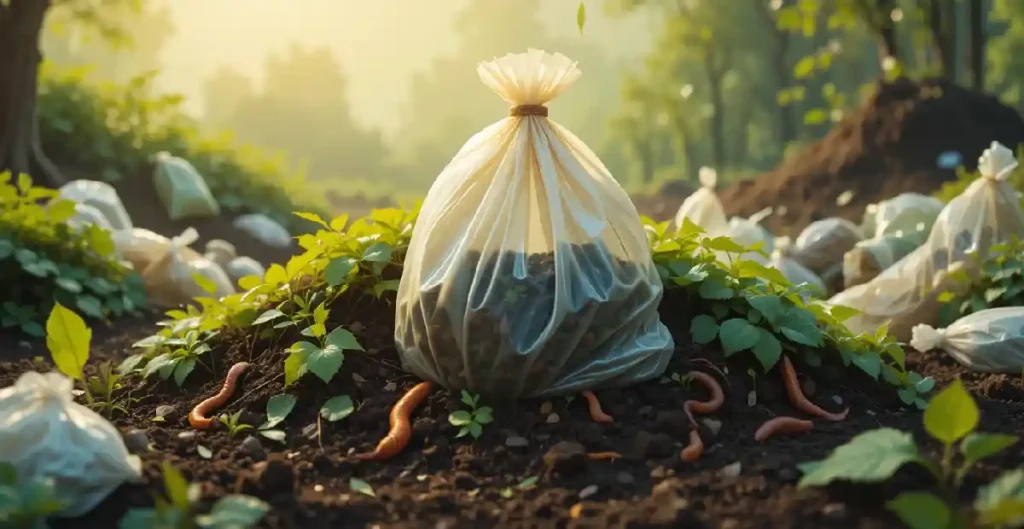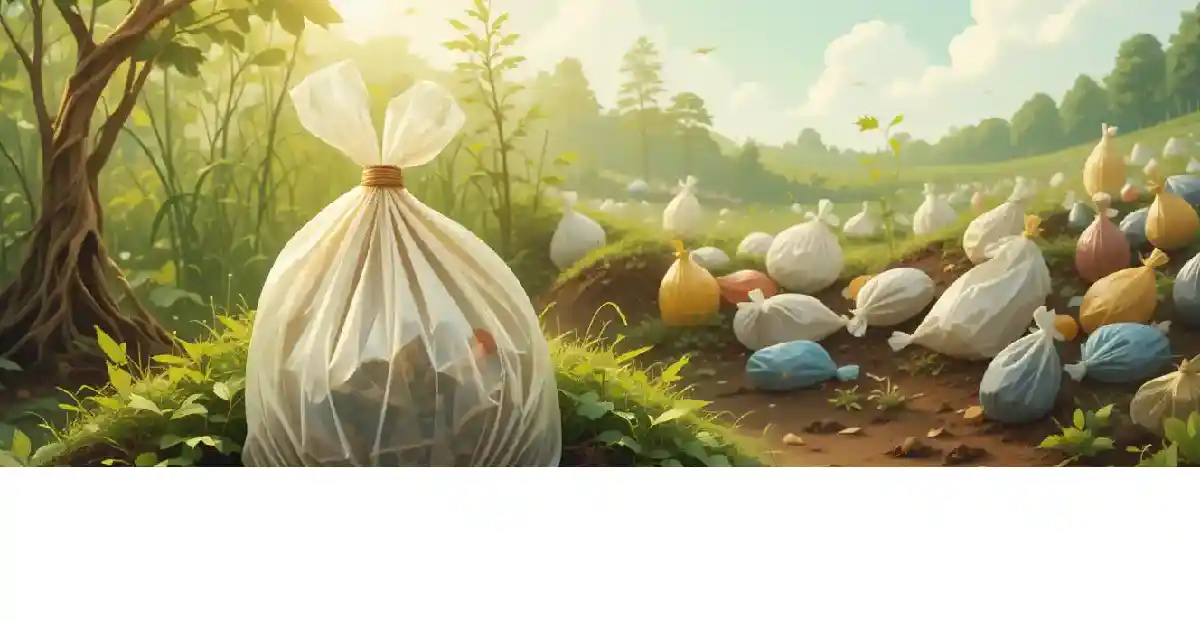Story:Are compostable bags really good for the environment? Or is there more to their environmental impact? Learn this shocking truth that may change your choices when choosing green!
Are Compostable Bags Good for the Environment?
While compostable bags can be advantageous because they break down more easily, they still are a form of plastic that can endanger the environment. But they have their own limitations. Compostable bags, on the other hand, do need some right conditions to break down but still help to lessen the plastic burden.
Why does this matter: With increasing awareness of plastic pollution and its negative impact on the environment, more and more people are searching for sustainable alternatives. Compostable bags are becoming a bit trend forward these days, largely due to the hype that they help to minimize our plastic footprint. On the surface, they appear to be an environmentally friendly alternative, but to buy deliberately and in a sustainable way, we need to know the whole story.
How This Article Assists You in Making Decisions — This article dives into the pros and cons of compostable bags including their environmental benefits as well as their challenges on an everyday basis. So, you should have a more clearer vision of the answer to this question by the end of this article, Are Compostable Bags Good for the Environment or Not.
Table of Contents
ToggleUnderstanding Compostable Bags
What Are Compostable Bags?
Compostable bags: A compostable bag is a bag that is made from natural materials such as corn starch or potato starch. In contrast to standard plastic that takes hundreds of years to disintegrate, compostable bags disintegrate completely when subjected to the proper conditions. The most basic examples are of compostable grocery bags, packaging, and waste bags.
How They Work in the Environment
Compostable bags break down faster than regular plastics. In industrial composting facilities, they decompose within months, turning into water, carbon dioxide, and organic matter. But are compostable bags good for the environment in all cases? Not always. Without proper composting conditions, they may not break down effectively, especially in landfills where decomposition is slow.
Difference Between Compostable and Biodegradable Bags
Though both are biodegradable, compostable bags are intended to decompose so that there are no toxic remains. Although biodegradable bags still produce microplastics. When you look at the question, Are Compostable Bags Good for the Environment, this differentiates as compostable is usually relatively cleaner but requires the appropriate disposal method.
Environmental Benefits of Compostable Bags

Reducing Plastic Waste
One advantage of using compostable bags is the lower plastic waste generation. They are created from sustainable resources and biodegrade more quickly than traditional plastic, helping burdening waste management systems. Providing compostable alternatives to conventional plastic helps reduce the proven amounts of non-degradable waste that persists in the environment.
Positive Impact on Landfills and Oceans
In a landfill, compostable bags break down a lot faster than plastic, meaning less landfill waste. In the ocean, these bags will break down quicker and reduce the threat to marine animals that commonly mistake plastic for food. The rapid breakdown rate means compostable bags are a safer choice for land and sea, stopping pollution at the source.
Lower Carbon Footprint
When compared to conventional plastic, a compostable bag has a lesser carbon footprint. Third, their production generally takes less fossil fuels and their disposal gives rise to fewer greenhouse gasses. This lessened ecological effect responds to a huge section of the inquiry. Are compostable bags good for the environment? By lowering emissions and promoting sustainability, compostable bags offer a cleaner, greener alternative.
Limitations and Concerns with Compostable Bags
Where They Can (and Can’t) Be Composted
Their compostability — and where to compost them (or not).
Most compostable bags require that they end up in industrial composting facilities where conditions are right for breakdown. These are special facilities where optimal high temperatures and controlled environments are created for effective decomposition. However, in the absence of these facilities, compostable bags are unlikely to break down in standard landfills or raising concerns about whether are compostable bags good for the environment when proper disposal is limited.
Durability and Usability
But unlike traditional plastic bags, compostable bags are not as durable. These can tear easily hence not good to carry heavy things in. Compostable bags also may not be overperformers when it comes to longevity compared to reusable bags, as wearing down makes them less ideal for all days.
Greenwashing and Misleading Claims
Consumers should be aware of so-called ‘greenwashing’, where further distinction is needed between products marketed as environmentally-friendly but not actually in the context of proper certification. A lot of so-called compostable bags do not conform to real environmental requirements. To help make sure you are selecting a truly compostable product, look for credible certifications, like the seal of the Biodegradable Products Institute (BPI). This allows consumers to know exactly what they are buying and what are compostable bags good for the environment.
Cost and Accessibility Challenges
Then there is the cost, which is the other aspect – compostable bags are more expensive than standard plastic or multiple use options. And since industrial compost facilities are relatively few and far between, many consumers may find it difficult to properly compost these plastic-free bags. Such obstacles may prevent wide adoption of compostable bags as a sustainable option.
Alternatives to Compostable Bags
Reusable Bags vs. Compostable Bags
In fact, a reusable bag is usually better for the environment and more convenient than a compostable bag. Reusable bags are made using sturdy materials with the intention of being used repeatedly which leads to a reduction in overall waste. Reusable bags are reusable up to hundreds of times, it is one of the most sustainable options for shopping and daily activities. Compostable bags, on the other hand, are designed for single-use and only break down properly under certain composting conditions. Compostable bags are a great way to lessen the impact on plastic, but reusable bags are obviously more convenient and make a bigger impact on the environment in the long run.
Biodegradable vs. Compostable Bags

What is the difference and why is knowing this difference so important when selecting your bags? Both these bags have been mentioned here because they tend to break down quickly compared to regular plastic bags, however compostable bags are designed to completely break down into non-toxic elements and do not leave behind any harmful residues. They might break down after the passage of time but that does not mean they are plastic bags free, it may only mean that they will leave microplastics in the environment. This difference raises questions about are compostable bags good for the environment, as true compostable options are generally more effective in minimizing environmental impact when disposed of correctly.
Recycling Plastic Bags
Send plastic bags to be recycled when composting is not an option. Several grocery stores run plastic bag recycling initiatives to help consumers return unused bags instead of throwing them out. It helps convert plastic into fuel and supports the recycling economy, preventing these from going into the landfill. As mentioned earlier, it is not as good as composting, but it is a good practice to reduce some of the environmental problems posed by single-use plastic bags, but they also have an environmental footprint. When consumers use compostable or reusable bags, and combine that with recycling, they are making much larger strides in minimizing their impact on the planet.
Tips for Using Compostable Bags Responsibly
Disposal Guidelines
In order for compostable bags to deliver on their earth-friendly promise, you have to use them correctly. However, the most appropriate method of getting rid of these bags is to throw them in the approved composting facilities that deal with compostables. If you have access to an industrial composting facility, dispose of them per their recommendations. Not all compost facilities accept compostable bags, so if you’re composting at home make sure your facility is one that does. Do Not Put Your Compostables in Regular Trash — Regular trash bins will result in contributing to landfill waste, so be sure to not take the easy route.
Look for Certification Labels
We recommend buying certified compostable bags to ensure that they are true compostable bags. Certifications that pass the test like the Biodegradable Products Institute (BPI) seal or ASTM D6400 certification can assure that the bags will compost well in technical composting facilities where the final test lies. These labels verify that the bags will actually biodegrade in a compost environment rather than just slapping an eco-friendly label on the packaging. So when you buy these eco-friendly bags, you can be assured that not only are you doing your part to reduce plastic waste, but you can also clearly answer the question, are compostable bags good for the environment.
Composting Without Facilities
Even if you have no composting facilities, you can dispose of compostable bags properly. If your nearby does allow for it, consider beginning a dwelling compost bin, and see if your bags may decompose in a backyard compost arrangement. Ans: In case of not being able to do composting at home, some community programs might have drop-off places for compostable items. Or, you can just make sure to never use a conditionally disposable bag again and simply replace them with reusable bags, the huge benefit is that your environmental impact will be greatly.
The Future of Compostable Bags in Environmental Sustainability
Innovation and Technological Advances
The Future of Compostable Bags in Environmental Sustainability
Innovation and Technological Advances
The future of compostable bags is bright, driven by innovation and technological advances in materials science. Researchers are developing new compostable materials that are even more effective and versatile, including bioplastics made from agricultural byproducts. These advancements aim to enhance the durability and usability of compostable bags while ensuring they decompose efficiently in various composting environments. As these innovations emerge, the question of are compostable bags good for the environment will be increasingly answered with a resounding yes, as they become more effective alternatives to traditional plastic.
Wider Industry Adoption
In grocery, retail, and food service, there is greater potential for using compostable bags. With consumers growing increasingly eco-aware, this trend is prompting companies to embrace more sustainable business practice. Grocery chains are already introducing compostable bags at checkout, and restaurants are switching to compostable take out packaging. As consumers are getting more and more aware of the ecological footprint of single-use plastic, and the related threats posed, there has been rising interest in pages since the consistent effort to lessen plastic pollution has evolved into ever greater technology-based mass consumption and sodality with formalized sustainability.
Role in Global Sustainability Goals

Compostable bags can also contribute to larger environmental initiatives, such as the United Nations’ Sustainable Development Goals (SDGs). Encouraging the use of compostable products helps to reduce waste, prevent pollution, and foster sustainable consumption habits. These are perfectly in line with responsible production and consumption, as well as climate action goals. With the increasing awareness regarding the impact of single-use plastics, compostable bags can be part of the solutions to creating a sustainable future, and whatever the answer to are compostable bags good for the environment, it is a more necessary choice over global sustainability.
Conclusion: Are Compostable Bags a Sustainable Choice?
Final Summary of Benefits and Drawbacks
Compostable bags are a great substitute for regular plastic bags, they help reduce plastic waste, have a low carbon footprint, and are greener alternatives for disposal. While they do offer drawbacks such as the need for tailored composting elements, questions around durability, and the chance of greenwashing. Compostable bags can also help to keep waste out of landfills, but their impact is dependent on appropriate disposal and access to composting facilities.
Are They the Right Choice for You?
In the end, the right bag for you comes down to your situation. Finally, if you have access to the right composting facilities and are willing to compost the bag as part of your efforts to be more eco-friendly, compostable bags can be a useful part of your sustainable toolkit. But if you value convenience and long-lasting performance or if you simply do not have access to composting options where you live, reusable bags may be a better fit for your life. Consider your lifestyle and the resources available to you before making a decision on incorporating compostable bags into your green efforts.
Frequently Asked Questions About Are Compostable Bags Good for the Environment?
What are the environmental benefits of using compostable bags over plastic?
There are a few environmental benefits of using compostable bags instead of regular plastic bags:
- Reduces Plastic Waste: Compostable bags decompose into nontoxic materials in composting settings, eliminating a large percentage of plastic waste going to landfills and oceans. This protects against the global plastic pollution crisis.
- To Reduce Greenhouse Gas Emissions: Using renewable resources in the production of compostable bags usually means their overall greenhouse gas emissions are much lower than petroleum-based plastics. Which leads to a lower carbon footprint over their entire life cycle.
- Better Soil Health: In case compostable bags are discarded in a composting facility where such materials can be processed, they will add organic input into the compost. This replenishes soil health and sustains plant growth, which contributes to healthy ecosystems.
- Less Threat to Wildlife: Compostable bags are less likely to become a physical threat to animals in the environment than plastic bags, which can ensnare animals.
- Advocating for Better Practices: Using compostable bags not only supports your sustainable lifestyle but also promotes sustainable consumption and sustainable production trends, and forces industries to move toward green alternatives.
Choosing compostable bags allows consumers to positively affect the environment while supporting efforts to eliminate plastic waste.
Do compostable bags fully decompose in home compost bins?
home compost bins), compostable bags might not break down completely, and some of the factors involved are.
- Composting Process: Home compost bins usually do not produce sufficiently high temperatures to break down all of these bags, particularly if they are made of materials that need industrial composting conditions. Industrial facilities also hold the appropriate temperature and moisture for proper decomposition.
- Compostability: The type of material being used — some compostable bags are meant for a commercial compost and will not break down in your backyard. If you wish to use those in a home bin, make sure the bags are marked as suitable for home composting.
- What is in your compost: Just as the composition of your compost plays a role in how well decomposition works. Having a good balance of green (high in nitrogen content) and brown materials (high in carbon content) improved the decomposition process, and sufficient aeration and moisture can also help facilitate better composting.
Time Frame Even if a compostable bag is capable of breaking down in your home compost bin, it might not happen as quickly as you think — and depending on how you compost and the makeup of the bag, this could take months or even a year.
Make sure to verify the specifications from the compostable bags you are using and continue your compost practices accordingly to yield the desired results.
Are compostable bags really eco-friendly, or is it just marketing?
While compostable bags may seem environmentally friendly, as those consuming the product, we should keep some factors into consideration as this approach is not a clear winner always:
- The Material: for most of the time, compostable bags are made from renewable resources, like corn starch or other plant materials. The eco-friendliness of these materials can be viewed considering their lower environmental impact compared to petroleum-based plastics.
- Correct Disposal: Compostable bags should only be considered environmentally friendly if they are disposed of in the right way. That means ideally, they should be sent to a composting site where they can endure the specific conditions required to break down properly. If that goes to a landfill, it’s not going to break down the way you think, which kind of negates the whole environmentally friendly benefit of it.
- Standards and Certification: True compostable bags bear certifications that prove they meet composable standards like those regulated by the Biodegradable Products Institute (BPI). Bags not having such credentials may not compost as well, therefore it becomes imperative for a consumer to look for authentic labels.
- In Comparison to Other Options: Compostable bags have their place in cutting down on plastic waste, but they are not the ultimate solution. When it is used over and over again, reusable bags typically have a lower environmental impact in the long run because they don’t require as much energy and natural resources to keep making them.
- Risk of Greenwashing: Since compostable products are touted as environmentally-friendly, some manufacturers might use this term without adhering to acceptable standards. While this is positive progress, consumers should be wary and do their research before buying.
- Bottom line: compostable bags can be environmentally friendly if used and disposed of correctly, but watch for certifications and the larger scopes of waste management and sustainability.
Can compostable bags harm wildlife or marine life?
Compostable bags are not as plastic and are less dangerous for wildlife and ocean animals if they get into the environment, but still have a lot of risk and issues associated with proper disposal of that compostable bag:
- Partial Breakdown: If compostable bags end up in the wrong composting facility, they might not fully decompose. However, if these bags are littered in natural environments, they can still litter and pose a danger to animals that might eat or get entangled with them.
- Misleading Disposal: The fact that some consumers think that every sort of compostable bag can decompose in any kind of environment. These bags can still pollute the ecosystem and create the same problems as plastic waste if they are littered or discarded incorrectly.
- Potential Marine Life Dangers: Compostable bags may be great, except when they start to get into oceans and waterways, which is a major problem if they don’t break down as intended. These bags may be eaten by animals that confuse them with food, leading to injuries or even intestinal obstruction.
- Latex: Few of the compostable bags might be contaminated with one or the other material that will not dissolve or that might be harmful to wildlife To minimize such risks, it is crucial to select compostable bags that have been certified in accordance with important industry standards.
It is important to ensure they are composted properly by being put into compost and sent to appropriate composting facilities to reduce potential risk of harm. Educating the public on what to do with compostable products is likewise crucial in how we preserve our wildlife and marine ecosystems.
How can I be sure my compostable bag is certified and eco-friendly?
To ensure that your compostable bag is certified and eco-friendly, follow these steps:
1. Look for Certifications: Check for recognized certification labels on the packaging, such as:
- Biodegradable Products Institute (BPI): Indicates the bag meets composability standards.
- European EN 13432: A certification for compostable materials in Europe.
- ASTM D6400: A standard in the U.S. for compostable plastics.
2. Read the Label: Examine the product label for specific claims about composability. Look for phrases like “commercially compostable” or “home compostable.” Be cautious of vague terms like “eco-friendly” without supporting certifications.
3. Research the Manufacturer: Investigate the brand or manufacturer of the compostable bags. Reputable companies will often provide information about their sourcing, production processes, and certifications on their websites.
4. Check for Material Information: Ensure the bag is made from materials known to be compostable, such as plant starches or other renewable resources. Avoid bags with unclear or unverified materials.
5. Ask About Disposal Instructions: A responsible manufacturer will provide clear disposal instructions. Ensure the bag is suitable for the composting facilities available in your area, whether that’s home composting or industrial composting.
6. Review Customer Feedback: Look for reviews or testimonials from other consumers regarding the effectiveness and composability of the bags. This can provide insight into the product’s performance and eco-friendliness.
By following these steps, you can confidently select compostable bags that are genuinely certified and environmentally friendly, helping to reduce your ecological footprint.
Are there better alternatives if I don’t have access to composting?
If you don’t have access to composting, there are several better alternatives to compostable bags that are environmentally friendly:
1. Reusable Bags: Investing in high-quality reusable bags is one of the best alternatives. They can be used multiple times, reducing overall waste. Look for options made from durable materials like cotton, jute, or recycled plastics.
2. Biodegradable Bags: Some biodegradable bags break down in landfills over time. While they still pose some environmental impact, they can be a better choice than traditional plastic bags. Look for bags labeled as biodegradable and certified to ensure they break down more effectively.
3. Paper Bags: Paper bags are a good alternative for short-term use. They are recyclable and biodegradable, making them a better option than plastic bags. However, ensure they come from sustainable sources to minimize their environmental impact.
4. Tote Bags: Canvas tote bags are sturdy and designed for long-term use. They are an excellent choice for shopping and can replace single-use bags effectively. Many brands offer them in various designs, making them stylish and functional.
5. Avoiding Single-Use Bags: Whenever possible, try to avoid using bags altogether by bringing your own containers or simply carrying items without a bag. This minimizes waste and promotes a more sustainable approach to shopping.
6. Community Resources: Some communities have programs that offer access to composting facilities or biodegradable bag recycling. Research local options that may support more sustainable practices.
By choosing these alternatives, you can reduce your environmental impact and contribute to a more sustainable lifestyle, even without access to composting facilities.
What should I consider when choosing between compostable and reusable bags?
As for the choice between compostable and reusable bags, here are a few points to consider:
- How Often You Use It: If you want to use the bags much more often, reusable bags are the more environmentally friendly choice. Unlike single-use compostable bags, they produce much, much less waste over time, since we can use them many times!
- MATERIALS AND DURABILITY: Check the materials used for both options Reusable bags are generally crafted from elements such as cotton, jute, or resistive plastics that will be associated with regular uses. Compostable bags, on the other hand, can be less durable for heavy items.
- Environmental Effects: Think about how long bags will actually last. Considering that reusable bags are never constantly being produced and discarded like single-use bags are, they tend to ave a lower environmental impact overall in the long run. Even though they’re not plastic so they’re better if you have to throw them away but you still use materials and energy to make them in the first place so realistically, it’s just wastage.
- Disposal: If you are using compostable bags, ensure they can be composted properly and you have access to composting facilities. Compostable bags might not decompose properly when discarded in landfills. Unlike the plastic bags littered along highways and clogging waterways, reusable bags do not need specialized disposal.
- Cost: Consider what it will cost you to choose one or other of them. Compostable bags can look cheap in the beginning but are generally single use bags. Ultimately, spending on reusable bags can be more cost-effective over time, as they are made to be used (at least in theory) several times.
- Convenience: Think about your lifestyle and ease. Instead, consider sticking to reusable bags, which you can keep in the car or near the door, and compostable bags which might be used on special trips, like grocery store trips.
- Personal Values: Consider your values, and relationship to sustainability. So if your goal is to reduce waste as much as possible and achieve maximum long-term sustainability, then reusables may suit you better in this regard. However, if your concern is mainly about short-term reduction of plastic waste, compostable bags would work great.
Considering these dimensions will guide you to a wise choice based on your lifestyle, environmental values, and practical requirements.





